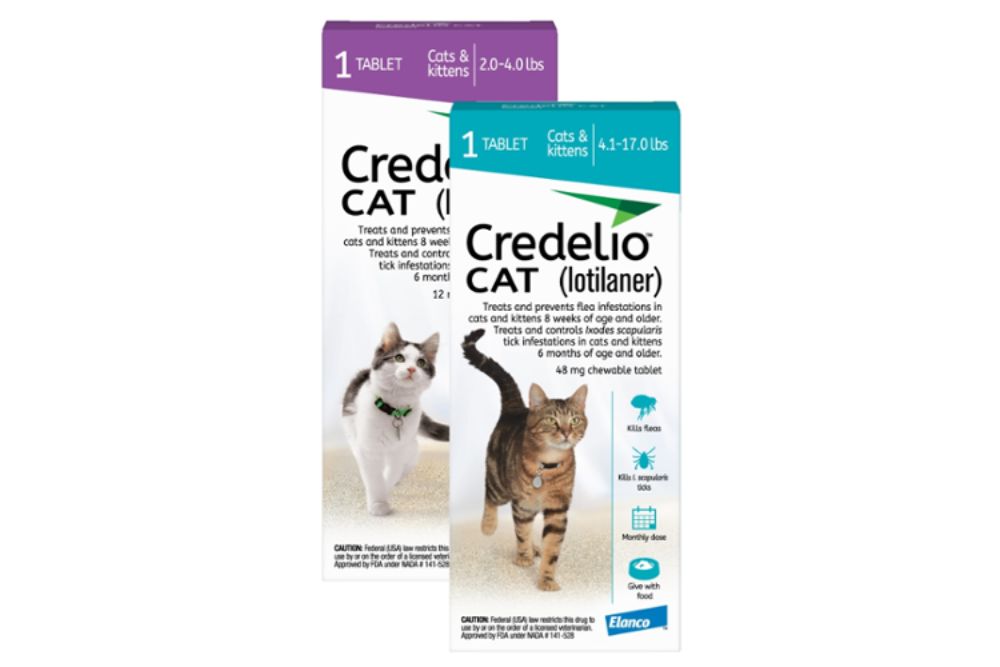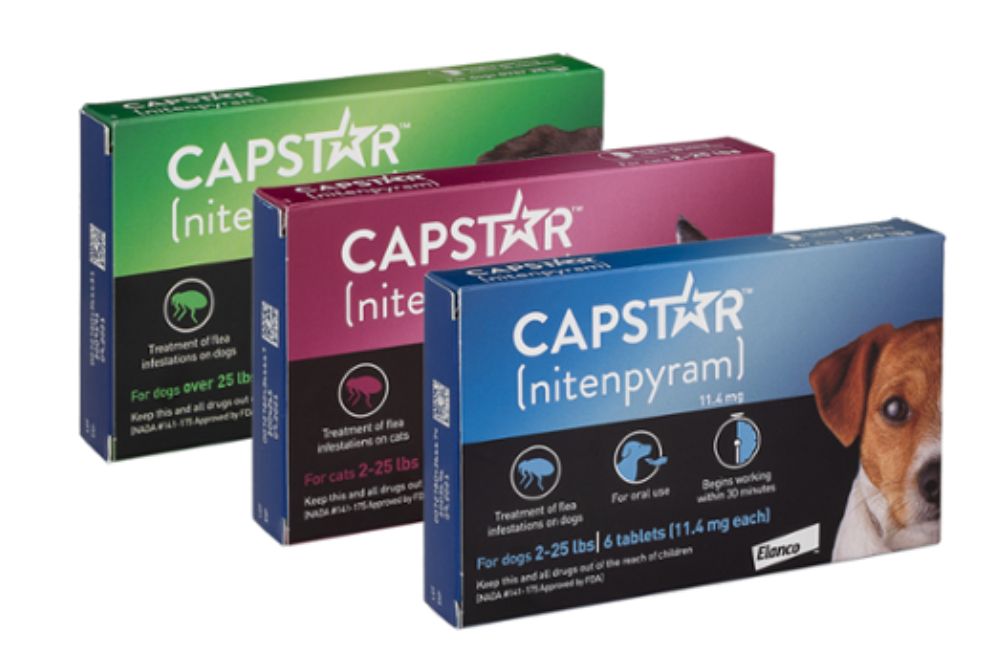Flea Medicine for Cats: Vet-Recommended Pills, Topicals, and Collars

All featured products are chosen at the discretion of the GreatPetCare editorial team and do not reflect a direct endorsement by the author or reviewer.
The word “flea” doesn’t have any positive connotations. Any sentence that contains variations of the words “you,” “have,” and “fleas” is an instant nightmare. Our feline friends are susceptible to the ill effects of infestation including itching and anemia, but flea medicine for cats is readily available and is essential for protection.
“The best prevention and practice for owners is to always keep cats that are in their home on some type of flea prevention,” says Dr. Michelle Brauneis, an associate veterinarian at Crosswinds Animal Hospital in Greenville, South Carolina.
Luckily, there are plenty of medication options available. Dr. Leigh Sheridan, veterinarian at The Cat Clinic in Columbia, South Carolina says we live in the “golden age of feline medicine,” and explains that there are a number of routes that a cat parent may choose when it comes to flea prevention for cats.
Top Vet-Approved Flea Medicine for Cats
- Best Flea Medication: Credelio
- Best Topical Flea Medication: NexGard COMBO
- Best Fast-Acting Flea Medication: Comfortis
- Best Flea Medication for Kittens: Capstar
- Best Cat Flea Medication Without a Prescription: Frontline Plus
- Best Flea Collar: Seresto
How We Chose the Featured Products
The products featured here were either specifically recommended by veterinarians or selected on the basis of general guidelines detailed by veterinarians. In all cases, reviews by consumers were also weighed, and factors such as apparent ease of use, effectiveness, and cost were considered.
Types of Cat Flea Medication
Flea medicine for cats is available in different forms including:
- Oral flea pills and chewables
- Topical treatments
- Flea collars
Topical preventatives ensure that cats get what they need out of a flea preventative, and they’re often the easiest option for everyone involved, says Dr. Brauneis. “We understand that it can be an inconvenience, since it does make their hair a little greasy and you can’t love on them until it’s dry,” she says, “so, we usually recommend applying it before bedtime, so that by morning, the area is dry.”
Many oral preventatives are excellent, adds Dr. Sheridan, but because they depend on the flea actually biting the cat in order to get the drug into the flea, they won’t be ideal for cats that have a flea allergy. “A topical application that kills the fleas before they bite is better for allergic cats,” she says.
Of the three types of flea preventatives, Dr. Sheridan finds flea collars to be the least effective because they can be uncomfortable for cats and depend on a fairly precise fit in order to work properly. But flea collars are better than nothing, and do offer a base level of protection.
Ultimately, she says the plethora of preventatives out there means it’s relatively easy to find one that works best for your and your cat’s situation. “The best flea prevention is any brand that is safe for your cat, is easy to use, dependably kills the fleas for as long as it’s supposed to, and is affordable for you,” says Dr. Sheridan.
Best Flea Medicine for Cats: 5 Safe Vet Recommendations
All featured products are chosen at the discretion of the GreatPetCare editorial team and do not reflect a direct endorsement by the author or reviewer.
Best Flea Medication for Cats
Our Pick: Credelio

This preventative is safe for cats 8 weeks and older, and it attacks the fleas’ central nervous system. Sheridan says it’s her go-to oral cat flea medication because in her experience “it seems to have the best efficacy and lowest incidence of side effects of the monthly oral preventatives.”
She also says the chewable pill itself is pretty tiny and relatively easy to give your cat, which you only need to do once a month.
Key Benefits
- Chewable tablet makes dosing easy
- Starts killing fleas within 6 hours
- Safe for kittens 8 weeks and older

- Tiny and tasty chewable tablet designed specifically for cats
- Fast-acting flea protection that lasts the entire month
- Kills blacklegged (deer) ticks, the most common species infesting cats*
Best Topical Flea Medication for Cats
Our Pick: NexGard COMBO

For easy-to-administer, broad-spectrum parasite prevention, it’s hard to beat NexGard COMBO. It’s the first and only topical treatment for cats that not only kills fleas and ticks, but also protects against heartworm disease, roundworms, hookworms, and tapeworms.
Best of all, there’s no need to persuade your cat to down a pill, tablet, or chew. Simply apply the topical solution to the back of your cat’s neck once a month for comprehensive parasite prevention. NexGard COMBO dries quickly and gets absorbed into the bloodstream quickly to offer full-body protection against fleas and other pesky parasites.
Key Benefits
- Combines the flea-fighting power of esafoxolaner, eprinomectin, and praziquantel
- Kills black-legged and Lone Star ticks
- Treats and controls roundworms, hookworms, tapeworms
- Prevents heartworm disease
- Can be used on kittens 8 weeks of age and older
- Safe for cats weighing 1.8 lbs or more
Best Fast-Acting Cat Flea Medication
Our Pick: Comfortis

Comfortis starts to kill fleas in 30 minutes, which makes it a great option for fast relief. Dr. Sheridan says it kills fleas by attacking their muscles. Comfortis also has the added benefit of being chewable and only needing to be given once a month.
This preventative should only be given to cats older than 14 weeks, and it should not be given to cats with a history of seizures.
Key Benefits
- Easy to dose, chewable tablet
- Starts working quickly to kill fleas
- Protection lasts for a month
Best Flea Medication for Kittens
Our Pick: Capstar

This flea-killing treatment for cats is one of the few that can be given to cats as young as 4 weeks old. It works by causing nerve damage to the fleas, says Dr. Sheridan. “[It’s] very fast-acting, causing flea death within about 30 minutes, but its effects only last for about a day,” she adds.
Giving your cat or kitten this pill as often as every 24 hours might be an inconvenience, but the immediate relief was widely noted by many cat parents who used the product. Many veterinarians recommend Capstar for a quick initial flea kill, then starting your cat on a longer-acting prevention. Your veterinarian can offer guidance on safely combining products in this manner.
Key Benefits
- Can be administered to kittens as young as 4 weeks old
- Kills fleas within 30 minutes
- Less messy than topical applications
Best Flea Medicine for Cats Without a Prescription
Our Pick: Frontline Plus

If you’re looking for a high-quality cat flea preventative without the need for a veterinary prescription, Frontline Plus is a great option. This topical application kills and eliminates fleas at different stages of the lifecycle and also protects cats from adult ticks and chewing lice. Protection lasts for 30 days and pet parents need to reapply this product monthly for continuous protection. It’s important that cats stay dry for 24 hours after application and is only recommended for cats and kittens 8 weeks and older.
Key Benefits
- Available without a prescription
- Protection lasts up to 30 days
- Kills fleas at all stages of their lifecycle
- Also protects against ticks and chewing lice
Best Flea Collar for Cats
Our Pick: Seresto

While she prefers topical and oral preventatives to collars, Dr. Sheridan says this is the best flea collar on the market in 2024. Not only does it also kill ticks, but it kills both pests quickly (about 24 hours for fleas and 48 hours for ticks).
And while one of Dr. Sheridan’s hang-ups with flea collars is how a perfect fit is essential for maximizing its efficacy, the Seresto flea collar is easily adjustable and has a quick-release feature for improved safety.
Key Benefits
- One collar offers up to 8 months of protection
- Odorless and non-greasy
- Two-way release mechanism for safety
- No prescription is needed
Do Cats Really Need Flea Medicine?
If you have an indoor cat, it’s easy to assume that fleas won’t be a problem. Of course, cats who spend time outdoors are more likely to be infected with fleas than those who stay exclusively indoors, but that doesn’t mean the latter are out of the woods when it comes to these parasites.
“In homes that have both cats and dogs, dogs coming in and out of the house can bring fleas inside. If cats spend any time outside, even out on the screen porch, fleas have a chance to become an issue,” adds Dr. Michelle Brauneis. “Even with indoor-only cat homes, there is a chance we can track fleas into the house and onto our pets.”
“Because cats groom themselves, they may remove fleas and signs of a flea problem to a large extent, so that it seems like dogs get fleas more frequently,” adds Dr. Sheridan. However, this doesn’t mean that fleas can’t pose a problem for cats.
The best way to protect your cat, your family, and your home from a flea infestation is to keep your cat on a year-round flea preventative.
Cat Flea Medicine Buying Tips and Advice
If shopping for flea and tick medicine, it’s important to discuss possible options with your veterinarian. Additionally, here are some things to consider and keep in mind:
Look at the active ingredients. All flea medications for cats feature different active ingredients to kill and prevent fleas, ticks, and other parasites. And some may be less effective than others. “Over-the-counter products that contain pyrethrin or permethrin are often ineffective because so many fleas have developed resistance to these drugs over the decades,” says Dr. Sheridan. “Even fipronil, which used to be the gold standard of flea prevention maybe 30 to 35 years ago, has issues with breakthrough infestations in some flea populations that have evolved to be fipronil-resistant.”
If you have any questions about the ingredients and their efficacy or possible side effects, have a conversation with your veterinarian.
Consider the application method. Pet parents should also consider the product’s application method and whether or not it fits into their lifestyle. Topical applications and collars may not be a good fit for families with young children who might be easily exposed to the ingredients. Additionally, not all cats will readily swallow pills, and giving a cat an oral tablet or capsule can become a chore.
Understand the dosing schedule. Dosing frequency should also be thought through when purchasing flea medication for your cat. While most medications are given on a monthly basis, some products offer longer protection. In order to achieve effective protection, pet parents need to follow the proper dosing schedule. If remembering to give your cat flea medication is a challenge, set up medication reminders or opt for products with longer protection windows.
Choose prescription products when possible. Lastly, Dr. Sheridan says prescription-strength products are more effective than over-the-counter alternatives, so it’s important to consult your veterinarian before starting a preventative. (You’ll also want to make sure the product you choose is safe for your cat and won’t interfere with any other medications they may be taking.)
*Little SE, Barrett AW, Nagamori Y, et al. Ticks from cats in the United States: Patterns of infestation and infection with pathogens. Vet Parasitol. 2018;257:15









